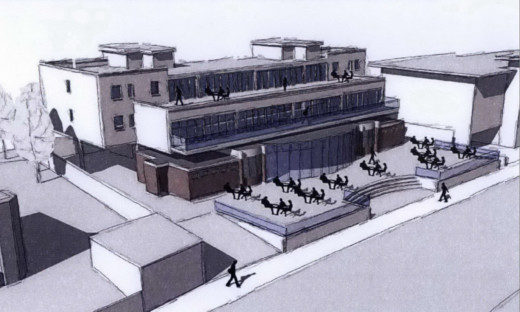A controversial planning application to transform the Glass Pavilion at Broughty Ferry Esplanade has been refused by the Scottish Government to the delight of the local community council.
The restaurant’s special art deco features would be lost if the listed building was surrounded by flats, Scottish Government reporter Donald Harris said.
Its architectural integrity would be diminished and building six apartments around it would be inappropriate and “an unsightly intrusion in the street scene.”
Perth Road Investments lodged an appeal with the Scottish Government after their application was rejected by Dundee City Council last year.
The former beach shelter is C-listed and was built in 1934 but was latterly converted into a restaurant.
Director of city development Mike Galloway had recommended granting the application. He accepted it was contrary to the development plan but believed there were material considerations to justify approval.
Councillors turned it down by 15 votes to 13, with local member Laurie Bidwell hoping the building could be left for people to enjoy and admire.
Perth Road Investments exercised their right of appeal, however, noting permission had previously been granted for very similar holiday flats in a project which had not been pursued.
They believed the listed building would continue to have architectural and historic merit following the proposed development works, which had been carefully designed to respect the pavilion’s character.
Broughty Ferry Community Council disagreed and warned the Glass Pavilion risked becoming “the concrete pavilion”.
The reporter rejected the appeal for both planning permission and listed building consent and David Hewick, planning secretary of the community council, said: “We are delighted that a damaging development of a well-loved listed building has been avoided.
“We are particularly grateful to the councillors who voted for refusal at committee stage and the members of the public who wrote objection letters to both the council and the reporter.
“It is hoped the dismissal of this appeal will help to safeguard the Glass Pavilion against future unsympathetic planning applications.”
He believed the safeguard would be reinforced if the listed building is included in Broughty Ferry Conservation Area, a proposal out for consultation.
“We also hope that the current operator of the restaurant can continue her good work without the distraction of such planning applications,” Mr Hewick added.
The city council had expenses awarded against it by the reporter because it had not recognised the property adjoining the site was a building containing two flats rather than a house.
The council claimed the term ‘houses’ did not exclude flats but the reporter disagreed.
He found the council unreasonably invoked an irrelevant policy in its reasons for refusal, which involved the appellant in some unnecessary work and expense.
